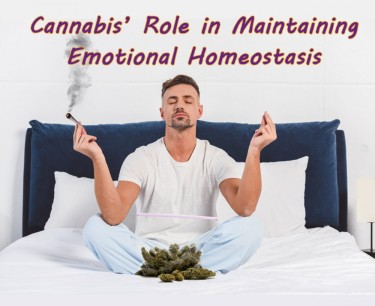Cannabis News
Catholics Against Cannabis? – What Archbishop Aquila of Colorado Gets Wrong about Marijuana Legalization
Published
1 year agoon
By
admin

Reginald vs. the Arch Bishop
Recently, I came across a pastoral letter penned by Archbishop Aquila of Colorado addressing his concerns around cannabis legalization and use. Written like an epistle to fellow Catholics, it aimed to sway opinions against the licensed cannabis industry.
As a long-time cannabis advocate, I felt compelled to respond in a similar literary fashion – as one man of the “hempen cloth” respectfully engaging another man of the “holy cloth.”
While our perspectives differ, perhaps this exchange in good faith can further mutual understanding on this complex issue from both moral and pragmatic lenses. The Bible does talk about cannabis, and it is not in a negative way at all!
Therefore, I’ve written my own epistle responding to the Archbishop’s major points from my own experience and reason. Let’s see what insights emerge from juxtaposing these alternating angles.
Now onward to my open letter rebutting the claims around legal cannabis dangers to society’s moral fabric and human dignity. As with all exploration of truth, there are always new depths to fathom through candid dialogue.
Dear Reasonable Readers,
It seems the esteemed Archbishop fancies himself the great savior sent to rescue the misguided masses from our wanton embrace of the devil’s lettuce. As a long-tenured voice for cannabis wisdom, I feel duty-bound to put nib to parchment addressing this woefully regressive scribing.
While I applaud any attempt at intelligent discourse, imposing one’s personal prohibitions under pretense of salving imaginary moral failings benefits nobody. Individual experience, not institutional dogma, should guide adult choices around cannabis and entheogens.
As a man of the (hemp) cloth myself, I speak for the reasoned liberty to explore consciousness on our own terms, according to inner authority. No earthly gatekeeper can govern the landscape of spirit.
The dear Archbishop surely means well in his paternalistic intentions, as misguided as they may be. But his desire to rescue reflects an antiquated worldview clinging to control as progress leaves it behind.
Therefore I will unravel his arguments with care, humility and wit – addressing notions of “public danger” in hopes of uplifting understanding between all people of compassion.
While our perspectives may differ, we share the highest aim of reducing suffering through wisdom. Surely some common ground exists sans condemnation of those finding solace or insight through this sacred plant’s gifts.
But first, a light roast and fresh bowl beckon to set the stage. Prepared thusly in body and mind, let us delve in…
One is not the other
A core mistake permeating the Archbishop’s thesis is conflating all “drugs” – from cannabis to fentanyl – invoking one to indict the other. But equating these substances betrays a superficial analysis, ignoring profound pharmacological differences.
Cannabis legalization has never been linked to increased opioid deaths. In fact, extensive data reveals the opposite – medical marijuana availability correlates to reduced opioid abuse and mortality.
The reason is simple – cannabis provides a safe alternative for pain relief with no lethal dosage, avoiding the addictive spiral of dangerous pharmaceuticals. Patients rationally substitute lower-risk cannabis for toxic prescription opioids.
So the proliferation of deadly synthetics like fentanyl is a crisis fueled by overzealous medical and recreational regulation, not legal plant access. Prohibition’s squeeze effect drives addicts toward ever more dangerous black market alternatives once cut off from legal channels.
If the dear Archbishop truly wishes to reduce opioid deaths, he would support fully decriminalizing possession for personal use to break cartel monopolies. Adults could access regulated supplies without life-crushing criminal penalties or impure street substitutes.
This public health approach understands you cannot temper human nature through moralizing and force. Only by meeting people where they are, with pragmatism and compassion, can positive change occur.
Demonizing safe, useful plants that never caused an overdose death makes little sense beside truly hazardous synthetics killing tens of thousands annually. Conflating them suggests reactionary reasoning rather than empirical cost-benefit analysis.
Moreover, traces of fentanyl in seemingly any street substance make blanket prohibition even deadlier in the age of mass poisoning. Preaching total abstinence amidst this crisis ignores on-the-ground reality.
While addiction is heartbreaking, we only compound the despair through judgment and incarceration. The divine light shines in each person intrinsically beyond circumstances. How much suffering has the Church inflicted through moral certitude?
Cannabis, meanwhile, presents no comparable public safety risk and offers profound mind-body benefits tempering addictive drives when used consciously. Where is the crime against human dignity in this healing ally?
I understand the Archbishop aims for moral clarity with easy categorical bans. But such reasoning collapses upon examination. We must drop fear-based ideologies to actually serve humankind’s welfare.
The essence is recognizing humanity’s agency with compassion, not exerting institutional control. Otherwise the Church joins the oppressors, forcing conformity that breeds resentment and rebellion.
If contradiction and hypocrisy undermine moral authority, what does logic say about incarcerating non-violent neighbors for using a non-lethal plant? Or blessing wine each Mass as holy while condemning far safer substances?
I ask only for philosophical consistency aligned with Christ’s teachings of unconditional love and forgiveness. If brewed beverages warrant no prohibition, how can anyone justify jailing adults for cannabis under a just God? What if Jesus told his followers to legalize the cannabis plant? Would Catholics rally and push politicians from the Right to do God’s Will?
The Free Will Argument
A contradiction arises when moral authorities condemn adults exercising free choice granted by God. Nowhere in scripture does Jesus model coercive prohibition against benign freedoms. So what precedent allows institutional power to override divine gifts?
The essence of Christianity centers on recognizing God’s supreme respect for human free will. Despite foreknowledge of sin and suffering, He trusts us with moral autonomy.
This begins in Eden’s garden. God implores guidance, not restriction – warning Adam and Eve to avoid forbidden fruit, yet allowing choice. He understands coercive control cannot cultivate growth.
Thus, we inherit the Creator’s image imprinted with intrinsic freedom of will. Every soul journeys toward salvation at its own pace through experiencing consequences. Spiritual maturity arises from difficult discernment, not blind obedience.
Outlawing choice attempts to undermine God’s trust in us to learn and grow wise. But forbidden fruit becomes most tempting, as the Archbishop knows. What purpose does banning plants serve except inflaming yearning and contempt for unjust laws?
Neither can institutions justly enforce morality – that realm resides only in our hearts. One cannot mandate compassion any more than love. To attempt coercion is to admit moral failure already.
Thus, heavy-handed prohibition contradicts core Christian values of forgiveness, redemption, and free will. It debases spiritual beings to wayward children requiring worldly authority’s firm discipline.
But what higher wisdom justifies caging peaceful neighbors for mind-altering sacraments ancient cultures have used for millennia? Who truly defies divine order – the seeker of revelation through nature’s gifts, or those claiming dominion over another’s soul?
If we each bear a spark of the infinite, who can righteously exert such control over another’s relationship with creation? The hypocrisy boggles spiritual logic.
Moreover, positive law remains only half the picture. Natural law and divine order supersede policies. While pragmatism has its place, the ultimate arbiter of right living resides in our sacred conscience beyond any institution.
Herein lies the paradox – one cannot enforce morality externally, only encourage it through teaching. People obey just laws because they align with innate ethics, not authority itself. So education and leading by example prove far more powerful than condemnation and punishment.
The Abbey wishes order through domination, but Jesus disrupted all social orders of oppression. He understood only the radically free can experience redemption. So whose way better aligns with the Christ vision?
I ask the Archbishop humbly consider this perspective. The Church has inflicted immense harm through moral certainty and suppression. But faith in human dignity calls us to lift up the oppressed and free prisoners, not bind souls to dogma.
By recognizing the divine already alive in every living being, we walk the path of love, forgiveness and liberation. Not through control but surrendering it do we see Spirit’s vastness. And by honoring free will do we partake in grace.
Serving the Vulnerable Means Ending Prohibition
A core contradiction arises when justifying prohibition as protecting vulnerable communities. In practice, criminalization exacerbates the very issues it purports to address by empowering the unregulated underworld.
The most economically and socially marginalized inevitably bear the worst brunt of underground drug markets and disproportionate enforcement. Banning substances doesn’t make them disappear – it concentrates the risks.
Without legal stability, those struggling with addiction become isolated from healthcare and treatment. Fear of condemnation or arrest deters confession and intervention until matters turn tragic. The social stigma around “criminal” behavior often proves deadlier than substances themselves.
Furthermore, prohibition grants immense wealth and firepower to cartels and gangs terrorizing vulnerable neighborhoods. They operate with impunity outside law, whereas legal commerce breeds accountability. No regulation means no safety controls on production or distribution.
So ironically, the quest to eliminate drugs through prohibition directly fuels poverty, violence, and despair in disadvantaged communities. It pullulates the very crisis used to justify its perpetuation. This endless, irrational cycle serves no one, least of all “the least among us.”
If we truly wish to serve those suffering, we must end the charade of prohibition that exacerbates every problem it claims to address. Only through legalization can we enact pragmatic regulations protecting the vulnerable instead of rendering them voiceless sacrificial lambs.
Surrendering moral indignation for nuanced harm reduction would better uphold human dignity. meeting people with support and care rather than condemnation. The road of excess may lead to wisdom when traveled consciously rather than under threat.
Surely a model guided by open reason would produce better outcomes than irrational policies claiming reason’s name while ignoring its principles. If facts matter, the case against prohibition is overwhelming on basis of real-world impacts.
I understand the desire for easy categorical bans in seeking order. But such control obsesses over deleting the undesirable rather than cultivating the good.
The divine path recognizes each imperfect being’s intrinsic worth beyond circumstances. It calls us to feed the hungry, to comfort prisoners, to treat all life as sacred no matter how far it has strayed. This vision must guide policy.
So I gently ask the Archbishop – do draconian prohibitions aligned with corporate greed and private prisons reflect Christ’s teachings? Is it dignified to cage non-violent neighbors while blessing wine each Mass?
My brother, true morality cannot be mandated through earthly policies, only encouraged by addressing root causes of despair – poverty, trauma, mental healthcare, community. From darkness, light is born. And the people yearn for shepherds, not judges.
We both seek health, hope and redemption for all. But we must tear down dividing walls imprisoning the most vulnerable. Then with humility, wisdom and grace, we can collectively build the more beautiful world our hearts know is possible.
His Hempiness,
Reginald Reefer
CATHOLICS AND CANNABIS, READ ON…
You may like
-


What if the World’s Biggest Tobacco Company Entered the Cannabis Industry?
-


cheeba cannabis & hemp academy Presents The Rise of the African Cannabis Industry Free WEBINAR tuesday, 4th February, 7 – 8:30pm SAST
-


5 Ways To Manage Return To Office
-


The Best Cannabis Infused Pasta Sauce For The Weekend
-


Ohio GOP lawmaker’s bill would upend voter-approved adult-use marijuana
-


Does Will Ferrell Consume Marijuana
Cannabis News
What if the World’s Biggest Tobacco Company Entered the Cannabis Industry?
Published
30 minutes agoon
February 1, 2025By
admin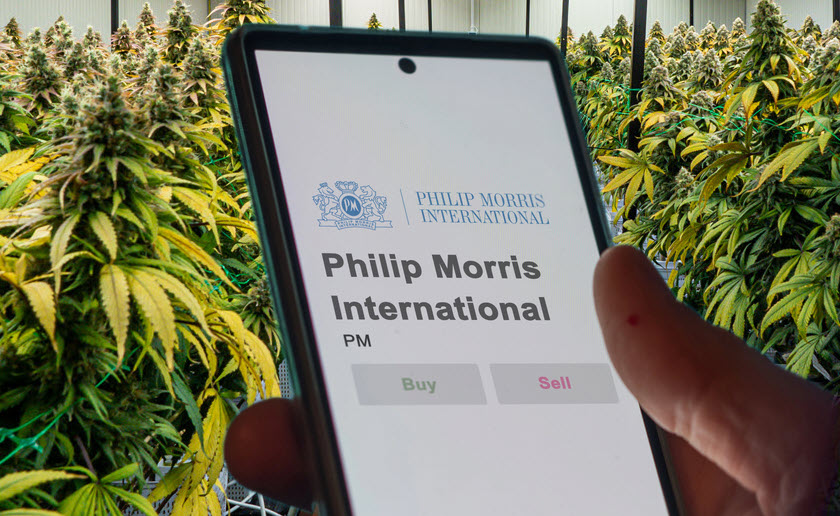
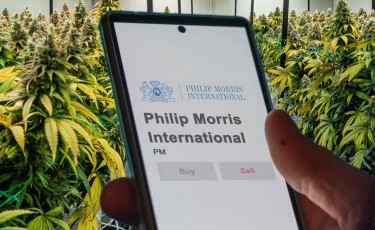
The World’s Biggest Tobacco Company Is Quietly Entering The Weed Industry
What Does This Mean For The Future Of Weed?
From the 1950’s to the 1990’s, cigarettes were considered to be a ‘cool’ habit and somewhat of a fashion accessory globally.
There was even a time when Hollywood celebrities were photographed smoking, which made them seem like the epitome of sophistication. Big names including Humphrey Bogart and James Dean were pictured smoking, but it was also so common and accepted around the world. That did not last long, as eventually evidence that cigarettes killed people from cancer and other fatal health conditions became impossible to ignore.
While there were many names in Big Tobacco that helped popularize the consumption of cigarettes, and made it easy for people to get access to it, Philip Morris International (PMI) were one of the biggest players – and they still are, to this day. They own some of the most common cigarette brands that are consumed around the world, including Marlboro, Chesterfield, and L&M. Surely, one can blame PMI’s products for tempting people to make poor health choices that may have taken them to the grave…
According to the World Health Organization, tobacco smoking is responsible for the deaths of around 8 million people globally.
Yet, with the rise of cannabis, PMI wanted a piece of the pie.
The History Of Philip Morris’ Interests In Cannabis
If you’re only hearing about Big Tobacco’s interest in cannabis right now, you might be shocked to learn that their interest in weed goes as far back as 1969. There are some internal documents that prove PMI was interested in learning about the potential of cannabis. However, they were considering weed a competitor as well as a potential product.
In fact, a 1970 memo even shows that PMI acknowledges the possibility of marijuana legalization.
Fast forward to 2016, when PMI made a significant investment worth $20 million to an Israeli biotech firm specializing in medical cannabis, called Syqe Medical. At the time, Syqe was working on developing a medical marijuana inhaler which would provide metered dosing of weed for medical patients. According to the deal, Syqe Medical will also work on developing certain technologies that would enable Philip Morris to minimize the health effects caused by smoking.
By 2023, Philip Morris made a deal to acquire Syqe Medical for a cool $650 million, as long as there were certain conditions met. In a report by Calcalist, the deal features a number of milestones, though the bottom line is that if the inhaler developed by Syqe passes the clinical trials, PMI will then go ahead to buy all shares of the company for the aforementioned amount.
Another Silent Move Into The Weed Space
More recently, in January 2025, a press release was published detailing Vectura Fertin Pharma’s (VFP), a subsidiary of Philip Morris International, joint venture with a Canadian biotech firm focusing on cannabinoid-based drugs – Avicanna.
According to the press release, the joint venture seeks to promote cannabis accessibility and research. Avicanna already has a stronghold in the wellness sector. However, the press release hardly makes any other mention about the involvement of Philip Morris International, but it’s clear that Big Tobacco has long had their eye in the cannabis industry. Back in 2016, when they first got involved with Syqe Medical, it highlighted the firm’s interest in wellness, but the partnership with Avicanna cements that.
Changes In Consumer Perception And Habits
It only makes sense for Big Tobacco to pivot to cannabis – or wellness, in general. After all, if you can’t beat em, join em!
And it’s clear: for several years now, there has been a decrease in cigarette smoking; young adults are now shifting from tobacco, as well as alcohol, and increasing their cannabis consumption instead.
And Philip Morris isn’t the only player in Big Tobacco who’s expressed an interest in a slice of the (weed) pie. Back in 2017, American holding company Altria Group began moving away from cigarettes, with their $1.8 billion investment into the Cronos Group, a large Canadian cannabis company. Altria owns several big American companies including Philip Morris; so much so, that even their website now declares the tagline: “Moving Beyond Smoking”.
However, Altria faced issues due to regulatory concerns.
British American Tobacco (BAT) has also been interested in cannabis. For some time now, they’ve been researching weed products, particularly infusing CBD and THC into their electronic cigarettes which are sold under the Vuse and Vype brand names. In 2021, BAT began a trial launch of CBD products in the United Kingdom.
RJ Reynolds, which is also now under British American Tobacco, has also considered joining the weed industry. According to internal documents, RJ Reynolds has considered cannabis both an opportunity and a competitor as far back as the 1970s.
Conclusion
At the end of the day, cannabis isn’t a real threat to the tobacco industry. The tobacco industry simply shot itself on the foot – all it needed was time, to prove that it does indeed cause cancer and kill people. On the other hand, cannabis was a friend more than a foe: legalization and a growing consumption of weed proved its ability to save lives.
That said, the relationship between tobacco and weed continues to evolve. Through cannabis legalization, Big Tobacco can learn from the challenges and opportunities that cannabis had to go through. It can be said that one thing is clear, though: the drop in tobacco consumption is a major opportunity for cannabis, with more people looking to substitute tobacco with a healthier alternative.
As a response, we may continue to see tobacco companies investing in Big Cannabis – just as we’ve seen in the examples mentioned above. This partnership is fantastic news for both industries, and we can only hope to see more!
PHILIP MORRIS’ MOVES IN CANNABIS, READ ON…
WHY DID PHILIP MORRIS JUST BUY A MEDICAL MARIJUANA INHALER COMPANY?
Cannabis News
Who are the Next 5 States to Legalize Recreational or Medical Cannabis Starting in 2025?
Published
24 hours agoon
January 31, 2025By
admin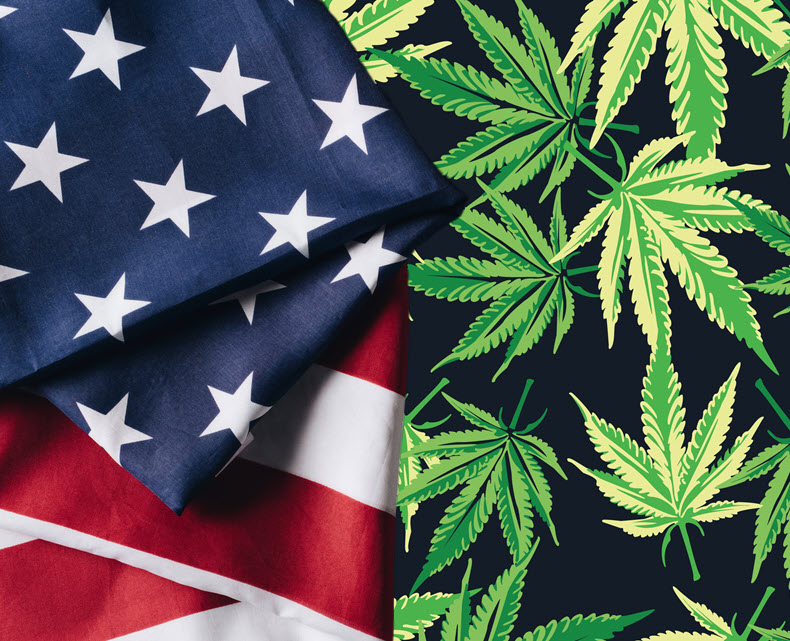
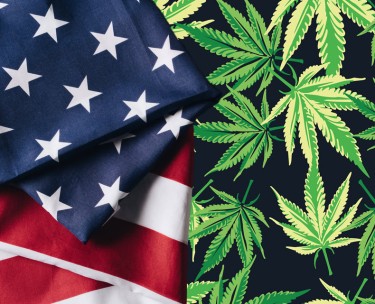
As the landscape of marijuana legalization continues to evolve across the United States, 2025 is shaping up to be a pivotal year for states considering reforms. Advocacy groups are closely monitoring legislative developments and public sentiment, identifying specific states that are likely to make significant strides toward legalization. This article explores the states most likely to legalize marijuana in 2025, examining the political climate, public opinion, and advocacy efforts that may influence these changes.
The Current State of Marijuana Legalization in the U.S.
As of 2023, a growing number of states have legalized marijuana for both medical and recreational use. According to the National Conference of State Legislatures (NCSL), 21 states and Washington D.C. have legalized recreational marijuana, while 37 states allow medical marijuana use. This rapid expansion reflects changing public attitudes toward cannabis, which have shifted dramatically over the past two decades.
Public Opinion Trends
Public support for marijuana legalization has reached unprecedented levels. A Gallup poll conducted in late 2022 found that 68% of Americans support legalizing marijuana, a significant increase from just 25% in 1995. This shift in public opinion is crucial for lawmakers as they consider new legislation. Advocacy groups are leveraging this support to push for reforms in states where legalization has yet to occur.
The Role of Advocacy Groups
Organizations such as the National Organization for the Reform of Marijuana Laws (NORML) and the Marijuana Policy Project (MPP) play a vital role in advocating for legalization. They provide research, mobilize grassroots campaigns, and lobby lawmakers to promote cannabis reform. Their insights into which states are most likely to legalize in 2025 are based on legislative trends, political dynamics, and public sentiment.
Key States Likely to Legalize Marijuana in 2025
Pennsylvania has emerged as a strong contender for marijuana legalization in 2025. The state has a robust medical marijuana program established in 2016 that has seen significant success, with over 600,000 registered patients. However, advocates argue that the time has come to expand access to adult-use cannabis.
Political Support
The recent election of Governor Josh Shapiro has energized legalization efforts. Shapiro has expressed support for legalizing recreational marijuana and has indicated a willingness to work with lawmakers across party lines. In early 2025, a bipartisan bill is expected to be introduced that aims to create a regulated market for adult-use cannabis.
Advocacy Efforts
Advocacy groups are actively mobilizing support among residents and lawmakers alike. Campaigns highlighting the potential economic benefits—such as job creation and tax revenue—are gaining traction. Additionally, public polls indicate strong support among Pennsylvanians for legalization, further bolstering advocacy efforts.
Hawaii has long been known for its progressive stance on cannabis; it was one of the first states to legalize medical marijuana in 2000. However, efforts to legalize recreational use have stalled in previous legislative sessions.
Current Developments
In 2025, advocates are optimistic about renewed efforts to pass comprehensive cannabis legislation. The Senate previously approved a bill aimed at legalizing recreational use, but it failed in the House due to opposition from conservative lawmakers.
Political Dynamics
The political landscape appears more favorable this year with new leadership in the House that may be more open to discussing cannabis reform. Governor Josh Green has also expressed support for legalization, emphasizing its potential economic benefits for Hawaii’s tourism-driven economy.
Advocacy Strategies
Advocacy groups are focusing on grassroots campaigns and community engagement to build momentum for legalization. Public forums and educational events aim to inform residents about the benefits of legalization while addressing concerns regarding regulation and safety.
South Carolina has made strides toward medical marijuana legalization but remains one of the few states without comprehensive access to cannabis products. In recent years, lawmakers have introduced several bills aimed at establishing a medical program; however, these efforts have faced significant hurdles.
Legislative Prospects for 2025
In 2025, advocates are hopeful that a revived medical marijuana proposal will gain traction. The proposed legislation would allow patients with qualifying conditions access through licensed pharmacies under strict regulations.
Political Climate
The political climate remains challenging, with resistance from conservative factions within the legislature. However, increasing public support—evidenced by recent polls showing over 70% approval for medical cannabis—may sway some lawmakers toward supporting reform.
Advocacy Efforts
Advocacy organizations like SC Compassionate Care are working tirelessly to educate the public and legislators about the benefits of medical marijuana. They emphasize patient stories and health outcomes as part of their strategy to garner support.
Kansas is one of the few remaining states without any form of legalized marijuana use. Despite this restrictive environment, there is a growing movement advocating for medical cannabis legislation.
Legislative Opportunities
In 2025, advocates believe there is a significant opportunity for progress on medical marijuana legislation. Several bills have been introduced in previous sessions that gained some bipartisan support but ultimately failed due to opposition from key lawmakers.
Public Sentiment
Public opinion in Kansas is shifting; recent surveys indicate that nearly 60% of residents support legalizing medical marijuana. This growing acceptance may influence legislators who have previously opposed reform.
Advocacy Strategies
Groups like Kansas Cannabis Coalition are actively campaigning for change by organizing rallies and educational events throughout the state. They aim to raise awareness about the therapeutic benefits of cannabis while pushing for legislative action.
North Carolina has been making headlines regarding potential cannabis reform. While it currently allows limited use of CBD oil for certain medical conditions, comprehensive medical or recreational legalization remains elusive.
Political Dynamics
In recent years, there have been increased discussions among lawmakers about introducing medical marijuana legislation. The current governor supports reform efforts; however, opposition from conservative members poses challenges.
Advocacy Efforts
Advocacy groups such as NC NORML are working diligently to build grassroots support for legalization initiatives. They focus on educating citizens about cannabis benefits while lobbying legislators directly.
Wisconsin’s approach toward cannabis remains conservative compared to neighboring states like Illinois and Michigan. While some local municipalities have decriminalized possession or implemented medicinal programs at their discretion, comprehensive statewide reform is still lacking.
Legislative Prospects
Advocates believe that changing political dynamics could lead Wisconsin toward more progressive policies regarding both medical and adult-use legalization by 2025. Recent elections have resulted in a more favorable balance within state government regarding cannabis issues.
Public Support
Public opinion polls indicate strong support among Wisconsinites—over 60% favoring legalization efforts—creating an opportunity for advocates seeking legislative change.
Advocacy Strategies
Organizations like Wisconsin NORML are mobilizing citizens through educational campaigns aimed at dispelling myths surrounding cannabis while promoting its economic benefits through taxation and job creation associated with regulated markets.
New Hampshire has long been considered an outlier among New England states regarding cannabis laws; it legalized medical marijuana back in 2013 but has yet to pass adult-use legislation despite numerous attempts over recent years.
Current Developments
In early 2025, advocates anticipate renewed efforts aimed at legalizing recreational use through proposed bills introduced during legislative sessions scheduled throughout spring months ahead.
Political Climate
While there is bipartisan interest among some legislators regarding potential reforms related specifically towards taxation structures associated with regulated markets—opposition remains strong from conservative factions within government bodies overall limiting chances significantly unless public pressure mounts significantly enough leading into future elections cycles ahead!
Virginia made headlines when it legalized recreational cannabis possession starting July 1st ,2021—but sales remain unregulated until further action occurs within state government bodies responsible overseeing these matters moving forward!
Legislative Prospects
Advocates believe that enhancing existing laws by adding regulated sales will be crucial steps towards creating an effective market structure benefiting consumers while generating tax revenue needed fund essential services statewide!
Conclusion
As we look ahead into 2025—the landscape surrounding marijuana legalization continues evolving rapidly across various states nationwide! With growing public support coupled alongside advocacy group efforts pushing forward reforms—it’s clear many opportunities exist within multiple jurisdictions ripe opportunities await those willing engage actively participate shaping future policies governing this vital industry.
WHAT STATES MAY NEVER LEGALIZE WEED, READ ON…
Cannabis News
Emotional Regulation Get Easier with Cannabis?
Published
2 days agoon
January 30, 2025By
admin

Emotional regulation refers to an individual’s ability to manage to various emotional stimuli in an appropriate manner.
When one is able to regulate their emotions, it means that they are able to withhold intense and extreme emotions, even when the situation normally calls for it. As a result, they are able to express their emotions in a proper way; it is controlled but not suppressed, it’s mindful and aware. Effective emotional regulation has been linked to emotional maturity, better relationships, and an improvement in overall well-being.
However, using certain drugs as well as alcohol have proven to negatively impact one’s ability to regulate their emotions. This is because drugs engage with the neurotransmitters in the brain, including those responsible for the production of serotonin and dopamine, which are necessary for healthy emotional regulation. When we consume central nervous system depressants such as alcohol, as well as stimulants in drugs, these severely impede our serotonin levels which can cause depression and other mental health issues. In addition, drugs have been found to affect emotional dysregulation and dependence.
But not cannabis.
According to the results of a clinical study conducted by researchers at the Oregon State University and Washington State University, inhaling weed containing over 20% THC was not found to have any impact on emotional regulation.
For the study, investigators analyzed the effects of weed smoking on 12 adults; all the participants already had experience smoking weed in the past and even used their own cannabis supply. The researchers then analyzed the mood and emotional regulation capabilities of the participants during times of sobriety as well as when they were stoned from weed. Surprisingly, they found that the subjects’ performance didn’t differ when made to undergo several tasks after smoking weed.
“There was no evidence that acute high-potency cannabis use affected participants’ implicit or explicit emotional regulation,” they said. The researchers also noted that the participants acknowledged there was an improvement in their mood and anxiety reduction after using weed.
“The current pilot study assessed whether being under the influence of high-potency cannabis flower affects emotion regulation among a sample of young adults who use cannabis regularly,” they concluded. “While participants reported more positive mood and decreases in anxiety while intoxicated, there was no evidence to suggest that intoxication from high-potency cannabis flower affected emotion regulation,” the researchers wrote.
How Else Can Cannabis Benefit Emotional Health?
Thousands of people rely on cannabis for its benefits on their emotional and mental well-being. In fact, most cannabis consumers have a positive association with cannabis and emotions, since it can effectively help them reduce encounters of negative emotions in general. For example, instead of ruminating in stress and worry, people can medicate with weed at the end of the day. This not only aids in relaxation, but also offers a natural, safe outlet for coping with the stresses of everyday life.
In the same vein, this is also why more individuals, particularly those in high-stress positions such as parents, CEO’s, and entrepreneurs, have made microdosing or getting high a part of their daily life. No longer is alcohol seen as the only way to cope: weed is in, and it’s a much healthier way of dealing with life.
While this may be something that science can’t explain just yet, cannabis does have the unique ability to slow down one’s racing thoughts and the endless mental chatter, while helping make it easier to focus on the present. For this reason and more, weed has already been widely integrated into many wellness retreats in legal cities. Weed, mindfulness, and yoga simply go together so well, enhancing the peaceful effects of one another. Cannabis consumers can also enjoy a great deal of relaxing activities with a heightened sense of enjoyment, effectively helping one forget about their negative emotions such as anger, stress, and frustration.
So the next time you’re feeling extremely irritable or pissed off, why not pop a gummy or have a toke, and spend some time outside. You’ll see how difficult it can be to stay mad.
What You Take Matters
For those who want to use cannabis to improve their emotional regulation, what you take – and how much of it – matters just as much too.
That’s why there are many more studies suggesting that low-dose THC is best especially for anxiety and stress. On the other hand, high doses of THC can be detrimental for your mental and emotional well-being.
According to a 2017 study conducted by researchers at the University of Illinois at Chicago and the University of Chicago: “We found that THC at low doses reduced stress, while higher doses had the opposite effect, underscoring the importance of dose when it comes to THC and its effects,” they said. The same is also true for psychedelics, which can partly explain the popularity of microdosing psychedelics. Meanwhile, anything that can you too high can in fact, cause intense anxiety and stress.
Conclusion
It can feel almost impossible to avoid stressful situations that can cause you to feel out of whack, emotionally. In fact, stress is just a normal part of life. But losing your temper, ruminating in negative emotions for hours, and being so upset that it affects other aspects of your life, is not normal.
That said, there are a variety of ways you can deal with stress and the negative emotions it brings. Cannabis can be a key ingredient for helping you restore balance in your emotions as well as mental health.
CANNABIS AND EMOTIONAL HOMEOSTATIS, READ ON…
CANNABIS FOR EMOTIONAL HOMESTATIS – WHAT WE NOW KNOW!

What if the World’s Biggest Tobacco Company Entered the Cannabis Industry?

cheeba cannabis & hemp academy Presents The Rise of the African Cannabis Industry Free WEBINAR tuesday, 4th February, 7 – 8:30pm SAST

5 Ways To Manage Return To Office

The Best Cannabis Infused Pasta Sauce For The Weekend

Ohio GOP lawmaker’s bill would upend voter-approved adult-use marijuana

Does Will Ferrell Consume Marijuana

Who are the Next 5 States to Legalize Recreational or Medical Cannabis Starting in 2025?

Star signs and cannabis strains: January 2025 horoscopes

Exactly What Is A Muse

Marijuana Microdosing May Help Early Dating Nerves

Distressed Cannabis Business Takeaways – Canna Law Blog™

United States: Alex Malyshev And Melinda Fellner Discuss The Intersection Of Tax And Cannabis In New Video Series – Part VI: Licensing (Video)

What you Need to Know

Drug Testing for Marijuana – The Joint Blog

NCIA Write About Their Equity Scholarship Program

It has been a wild news week – here’s how CBD and weed can help you relax

Cannabis, alcohol firm SNDL loses CA$372.4 million in 2022

A new April 20 cannabis contest includes a $40,000 purse

Your Go-To Source for Cannabis Logos and Designs

UArizona launches online cannabis compliance online course
Trending
-

 Cannabis News2 years ago
Cannabis News2 years agoDistressed Cannabis Business Takeaways – Canna Law Blog™
-

 One-Hit Wonders2 years ago
One-Hit Wonders2 years agoUnited States: Alex Malyshev And Melinda Fellner Discuss The Intersection Of Tax And Cannabis In New Video Series – Part VI: Licensing (Video)
-

 Cannabis 1012 years ago
Cannabis 1012 years agoWhat you Need to Know
-

 drug testing1 year ago
drug testing1 year agoDrug Testing for Marijuana – The Joint Blog
-

 Education2 years ago
Education2 years agoNCIA Write About Their Equity Scholarship Program
-

 Cannabis2 years ago
Cannabis2 years agoIt has been a wild news week – here’s how CBD and weed can help you relax
-

 Marijuana Business Daily2 years ago
Marijuana Business Daily2 years agoCannabis, alcohol firm SNDL loses CA$372.4 million in 2022
-

 California2 years ago
California2 years agoA new April 20 cannabis contest includes a $40,000 purse







